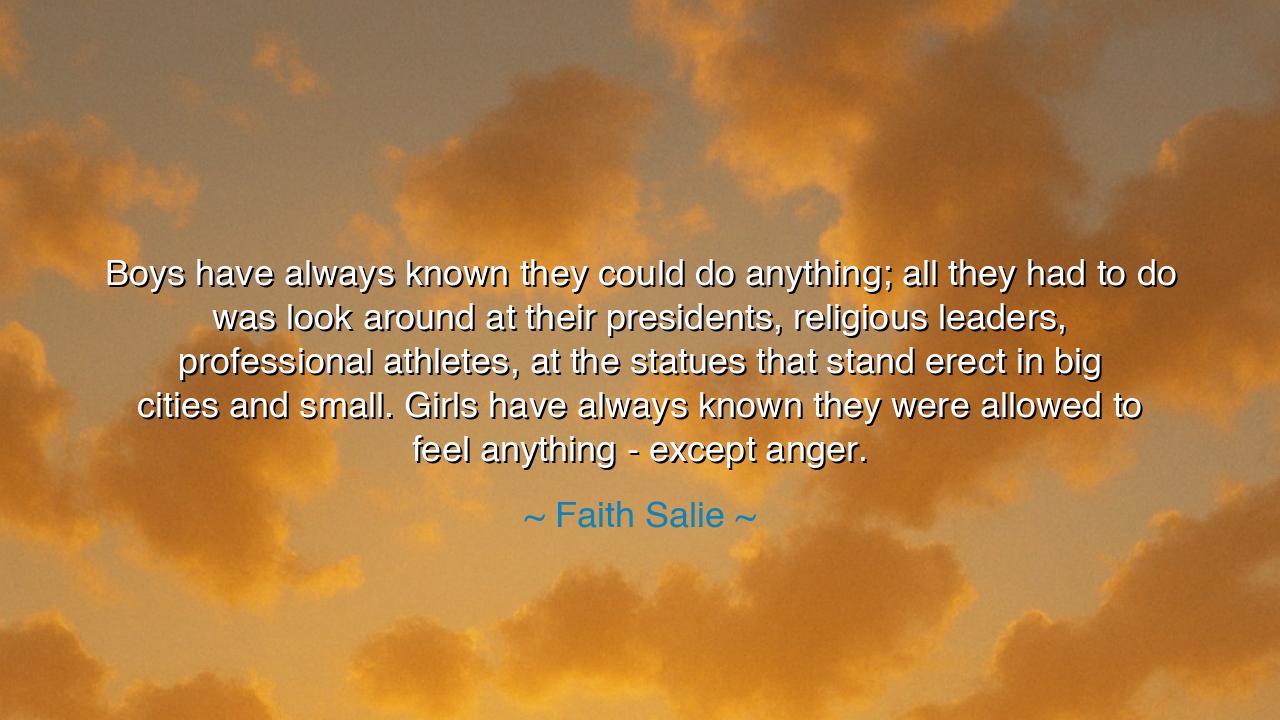
Boys have always known they could do anything; all they had to do
Boys have always known they could do anything; all they had to do was look around at their presidents, religious leaders, professional athletes, at the statues that stand erect in big cities and small. Girls have always known they were allowed to feel anything - except anger.






Host: The room feels reflective, as though the conversation is about to delve into the complexities of gender, expectation, and emotion. The soft evening light fills the space, casting long shadows that stretch across the floor. Outside, the world continues at its usual rhythm, but inside, the air feels charged with the idea of societal expectations and how they shape our identities. Jeeny sits at the table, her fingers lightly tracing the rim of her cup, her expression thoughtful. Jack stands near the window, arms crossed, gazing out at the street below.
Jeeny: (her voice gentle, yet filled with curiosity) “You ever think about how we’re taught to express ourselves—how society gives permission for certain emotions depending on who you are? How, for some people, emotions like anger are seen as powerful and empowering, while for others, they’re viewed as inappropriate or unwelcome?”
Jack: (glancing over at her, his voice dry, but intrigued) “Emotions and gender? Yeah, it’s interesting how men and women are often given different emotional permissions. For some, anger is a tool of strength, while for others, it’s something that’s discouraged. What made you think about it?”
Jeeny: (nodding slowly, a small smile forming as she shares her thought) “I was thinking about something Faith Salie said: ‘Boys have always known they could do anything; all they had to do was look around at their presidents, religious leaders, professional athletes, at the statues that stand erect in big cities and small. Girls have always known they were allowed to feel anything - except anger.’ It made me reflect on how society shapes the way we express and experience emotions, especially for women. It’s like certain feelings are seen as empowering for men but are deemed inappropriate or unacceptable for women.”
Jack: (pauses, considering her words carefully) “So, she’s saying that boys have been allowed to express strength, power, and even anger—because anger is seen as part of their strength and identity—but girls, on the other hand, have been told that they can feel everything except anger? That women’s emotional range is limited, especially when it comes to expressions of power?”
Jeeny: (smiling more deeply now, her eyes steady as she explains further) “Exactly. Salie’s point is that the emotional freedom granted to men isn’t granted to women in the same way. Men are taught to harness their anger as a form of strength, while women are often taught to suppress or hide their anger, because it’s seen as unladylike or threatening. It’s a reflection of how society has always shaped gender roles and emotional expression.”
Host: Jeeny’s words seem to settle in the room, creating a subtle shift in the conversation about gender, emotion, and societal expectations. Jack stands still, his expression softening as he processes the deeper message behind Salie’s statement. The world outside continues its rhythm, but inside, the conversation feels rooted in a more profound understanding of how emotions are experienced differently based on gender.
Jack: (his voice quieter now, almost reflective) “I see what she means. Anger is often seen as something that can empower men, but for women, it’s not just an emotion—it’s a challenge to the status quo. Women are conditioned to manage their emotions in a way that doesn’t threaten the expectations of them. It’s like there’s a double standard for how emotions are allowed to be expressed.”
Jeeny: (nodding slowly, her voice calm, yet filled with quiet strength) “Exactly. The societal pressures placed on women to suppress anger lead to an emotional double standard, where women’s strength and assertiveness are often seen as threatening or undesirable. This limits not only the way women express themselves, but how they are allowed to exist in spaces where power and authority are often tied to anger or aggression.”
Jack: (pauses, a small smile forming on his face as the idea sinks in) “It’s liberating, isn’t it? To realize that we can break down these expectations—especially for women. The freedom to express all emotions, including anger, is essential to truly owning your voice and power.”
Jeeny: (smiling warmly, her voice gentle, yet filled with wisdom) “Exactly. It’s about breaking down those boundaries and allowing both men and women to express their emotions fully, without judgment. Anger, when used constructively, can be empowering, just as much as any other emotion. It’s about giving ourselves permission to feel all that we are.”
Host: The room feels lighter now, as though the conversation has shifted into a deeper understanding of the role emotions play in shaping identity and how society dictates how we can express them. Jack turns from the window, his posture more relaxed, his thoughts clearly reflecting on the importance of breaking emotional boundaries. Jeeny watches him, content in the realization that emotional freedom, especially for women, is key to true self-expression and empowerment. The world outside continues its rhythm, but inside, there’s a shared understanding that breaking down emotional boundaries is essential to creating a more equitable and open space for all people.






AAdministratorAdministrator
Welcome, honored guests. Please leave a comment, we will respond soon